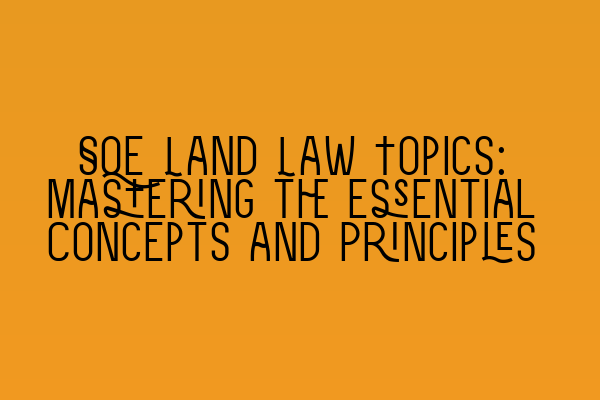SQE Land Law Topics: Mastering the Essential Concepts and Principles
Welcome to SQE Property Law & Land Law, your trusted source for comprehensive legal guidance on all matters related to land law. In this blog post, we will delve into the essential concepts and principles that every aspiring property lawyer must master. Whether you are a student preparing for the Solicitors Qualifying Examination (SQE) or a professional seeking to enhance your knowledge in this area, this article will serve as a valuable resource.
Before we begin, it is important to understand the significance of land law in real estate transactions. Land law governs the rights, interests, and obligations associated with land and property. It provides the legal framework within which individuals and organizations can buy, sell, lease, and develop real estate. Understanding the fundamental principles of land law is essential for navigating the complexities of property transactions and resolving any disputes that may arise.
The Concept of Property
At the heart of land law lies the concept of property. Property includes not just land but also any structures or buildings on it, as well as the rights and interests associated with land. These rights can range from ownership rights to easements, leases, and mortgages. By understanding the concept of property and the various rights that can exist, property lawyers can provide sound advice and protect their clients’ interests.
One important aspect of land law is the distinction between real property and personal property. Real property refers to land and anything attached to it, such as buildings, trees, and underground minerals. Personal property, on the other hand, includes movable possessions such as cars, furniture, and jewelry. While both types of property share certain legal principles, they are subject to different rules and regulations.
Ownership and Tenure
Ownership is a central concept in land law. It refers to the legal right to possess, use, and enjoy property. There are various forms of ownership, including freehold and leasehold. Freehold ownership provides the most complete and enduring form of ownership, where the owner has absolute rights and control over the property. Leasehold ownership, on the other hand, grants temporary rights to occupy the property for a specified period, subject to the terms of a lease agreement.
Within the realm of ownership, it is important to understand the concept of tenure. Tenure refers to the legal framework within which land is owned or held. Common forms of tenure include fee simple, life estate, and leasehold. Each type of tenure carries different rights and obligations, and understanding the nuances is crucial for property lawyers to effectively advise their clients.
Land Registration and Conveyancing
Land registration is a critical process in property transactions, as it provides an official record of rights and interests in land. The registration process involves filing relevant documents with the Land Registry, which then issues a title certificate to the registered owner. Land registration offers certainty and protection by providing public notice of an individual or organization’s rights in relation to a particular property.
Conveyancing is the legal process of transferring ownership of land from one party to another. It involves various stages, including the preparation of legal documents, searches to verify the title and reveal any encumbrances, and the exchange of contracts. Property lawyers play a vital role in ensuring a smooth conveyancing process and protecting their clients’ interests.
Landlord and Tenant Law
Landlord and tenant law governs the legal relationship between property owners (landlords) and those occupying the property (tenants). This area of law addresses issues such as lease agreements, rent payments, repairs and maintenance, eviction processes, and tenant rights and obligations. Property lawyers specializing in landlord and tenant law can assist both landlords and tenants in navigating the complexities of this legal landscape and resolving any disputes that may arise.
Property Development and Planning Law
Property development and planning law play a crucial role in shaping the built environment. These areas of law govern the process of securing planning permission for new developments, ensuring compliance with building regulations, and addressing environmental concerns. Property lawyers with expertise in this field can guide developers, local authorities, and individuals through the intricacies of property development and planning law.
Conclusion
Mastering the essential concepts and principles of land law is fundamental for anyone pursuing a career in property law. From understanding the concept of property to navigating land registration, conveyancing, landlord and tenant law, and property development, a comprehensive knowledge of land law is crucial for providing effective legal advice and protecting clients’ interests.
To further expand your understanding of related legal topics, we recommend exploring our articles on:
- Ethics in Contract Law: Navigating the Moral and Legal Dimensions
- Misrepresentation in Contracts: Unveiling Deceptive Practices
- A Closer Look at SQE Contract Law Syllabus
- SQE Contract Law: Analyzing Landmark Cases and Influential Judicial Decisions
- Contract Law for Services: Key Considerations and Best Practices
At SQE Property Law & Land Law, we are dedicated to providing you with valuable insights and guidance in all areas of property law. Stay tuned to our blog for more informative articles and resources.
